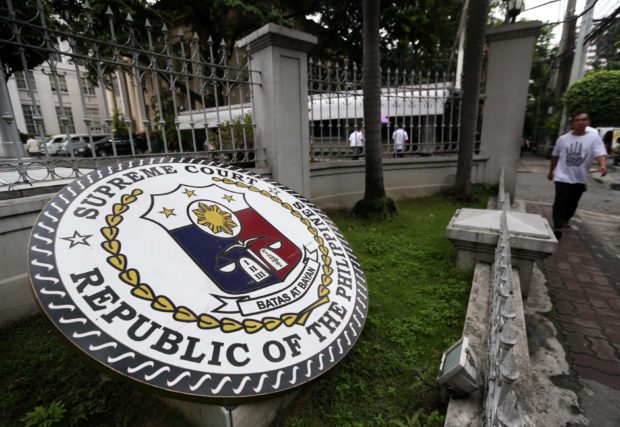SC orders disbarment of lawyer for ‘seeking public trial on social media’

FILE PHOTO: The Supreme Court logo. (INQUIRER/LYN RILLON)
MANILA, Philippines–The Supreme Court (SC) reminded the public that invoking the constitutional right of freedom of expression can’t defend posting or broadcasting information that is “lies or half-truths,” insulting others or destroying a person’s name or reputation.
In a decision made public Thursday, the SC, in a per curiam (anonymous) ruling, found lawyer Bertini Causing guilty of violating the Lawyer’s Oath and the Code of Professional Responsibility and meted him the penalty of disbarment from the practice of law.
The SC adopted the findings of the Integrated Bar of the Philippines (IBP). However, the SC modified the penalty recommended by the IBP from six months suspension from law practice to disbarment.
The SC acted on the complaint filed by Jackiya Lao who said that on January 18, 2019, Causing posted on his Facebook account a draft and yet-to-be-filed copy of his complaint-affidavit for plunder.
Lao said the social media post has destroyed her good name and reputation and subjected her to “public hate, contempt, and ridicule” in the eyes of Facebook users.
Causing, the lawyer of Roy Mabasa in the Percy Lapid case, confirmed in a text message that he is the subject of the Supreme Court decision. However, he has yet to issue a statement on the matter.
Causing did not deny being the author of the questioned Facebook posts and insisted that these were made in exercise of the freedom of the press and freedom of expression.
But the SC said Causing’s defenses are “untenable.”
“As a member of the Bar, Atty. Causing ought to know that Facebook–or any other social medium, for that matter–is not the proper forum to air out his grievances, for a lawyer who uses extra-legal fora is a lawyer who weakens the rule of law,” the SC said.
The SC said the respondent should have ventilated the issue before the Office of the Ombudsman.
“While freedom of expression is guaranteed by the Constitution, the lawyer’s oath and his duties and responsibilities ultimately serve as a limit thereto,” the SC said.
“We caution lawyers to be circumspect in their postings online. They are reminded to always practice restraint in their conduct, be it in real life or online. Otherwise, the rule of law may very well be completely circumvented and rendered nugatory by blatantly seeking public trial on social media,” it warned.
The SC said this is not the first time that the Court has sanctioned Causing, as he was previously suspended from the practice of law for a period of one year for violating the confidentiality of an ongoing family court proceeding.
“The aforesaid case and the case at hand show that Atty. Causing has the propensity to divulge sensitive information in online platforms, such as Facebook, to the detriment of the people involved in the said cases,” the SC noted.
In a statement sent to reporters, Causing laments that the SC’s decision “virtually acquitted the officials charged with plunder.”
He said with his disbarment, he is expecting that a dismissal of the plunder complaint would follow suit.”
The plunder case is related to the supposed overpriced food supplies distributed to the Maranao’s in Marawi. He said the basis of his complaint is a report from the Philippine Center for Investigative Journalism.
Causing added that he should not be considered a repeat offender because the Supreme Court’s warning that a repeat of a similar posts will be dealt with severely was issued in March 2021 while his Facebook about the plunder case was in 2019.
He added that the disbarment will also affect the assistance he provides to the family of slain broadcaster Percy Lapid and that he will not be able to support his 87-year old mother and 83 year old father.
Causing said he will file an appeal before the Supreme Court.
Previously, SC justices reminded lawyers to be mindful of what they have posted on social media, including communications with their clients.
READ: SC justices warn lawyers: No online posting of communications with clients
The SC is currently conducting consultation with stakeholders regarding the Proposed Code of Professional Responsibility and Accountability (CPRA), which seeks to improve and modernize law practice and provide guidelines for using social media by lawyers.
The CPRA tackles the use of social media, the formation and definition of the lawyer-client relationship, the conduct of non-legal staff, and other intricacies experienced by practitioners.
The CPRA also consolidates different regulations about the discipline of lawyers.